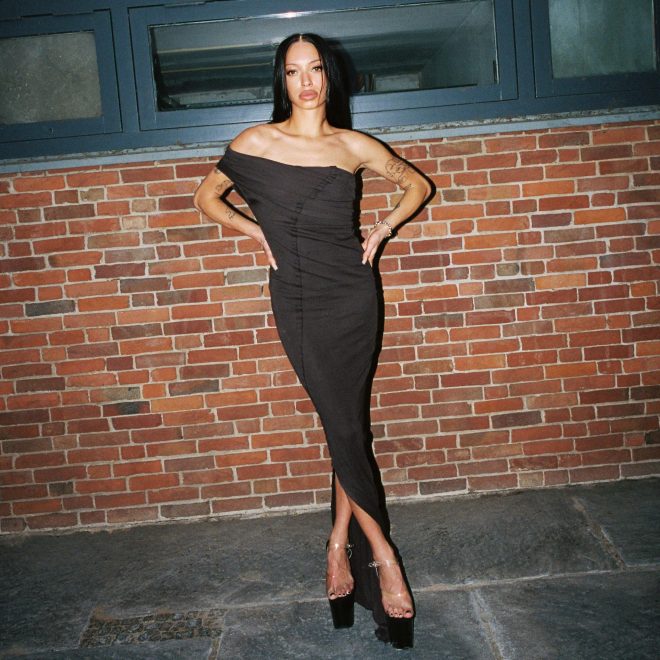Lovefoxy: lord juice is a cultural statement. Identity, visibility, and house music

Few artists have risen with the raw speed and personality of LOVEFOXY. In the space of four years, she has gone from Berlin’s underground to playing Boiler Room, Berghain, Tomorrowland, Awakenings, and a Paris residency at Badaboum. Yet milestones are only the surface. Her new EP, Lord Juice, distills what sets her apart: house music with bite, tracks that feel like living characters, and a stage presence that turns DJing into physical theatre. As the daughter of a Berlin club pioneer and a POC woman determined to write her own story, LOVEFOXY steps into ADE not just as another breakout act but as an artist staking out her manifesto, bold, unfiltered, and impossible to ignore.
The Making of Lord Juice
LOVEFOXY’s new EP, Lord Juice, doesn’t feel like just another release. It’s the moment she draws a line between her past and her future. Where her debut Burning Down The Sluthouse served as a classic house introduction, Lord Juice dives into something grittier, bolder, and far more personal.
“I feel like I definitely evolved between my last EP and this one. BDS was a classic house record, and I wanted to be introduced as a producer. In the process, I didn’t fully plan it to be anything specific; I was experimenting with ideas and directions, which resulted in numerous drafts. Parking ideas for a while is a great way for me to see if it still slaps. With this EP, I felt more drawn to gritty and fun statement pieces. A fun, well-rounded mix of everything, et voila, the Lord Juice EP!”
Her storytelling instinct is clearest in "Just Not Cute" and "On Da Table," two tracks that balance sass, humor, and raw energy in equal measure. They don’t just play as bangers; they act like characters in the room.
“A track for me should always tell a story, and this was the first time I played around with samples of my own voice. Especially ‘On Da Table’ was intended to tell the story of me climbing on each table that allows it, to celebrate with everyone in the room. The lyrics are quite clear and punchy and have a direct message and sass to them. The music is there to underline a certain energy in these cases – it’s sassy, fun, and hard-hitting.”
Tracks like Just Not Cute and On Da Table are more than party anthems; they’re snapshots of her character. They blur sass, humour, and raw energy into something both playful and sharp.

Performance, Identity, and Visibility
LOVEFOXY´s shows aren’t simple exercises in track selection or what people would just call “parties”; they’re full-body experiences, complete with heels, sweat, dancing on speakers, and sometimes leaping into the crowd.
“I am naturally someone with a lot of energy and having a stage and outlet for that as LOVEFOXY to DJ, it just really makes sense for what I want to give and achieve in each night or set I play. Don’t get me wrong, it can be tiring to perform fully all the time, so that varies in each space I step into. It’s also ok to let the music do its thing if that’s what the night needs. We do it for the people.”
That fearlessness, however, comes with its own shadows. As a female POC artist, LOVEFOXY navigates scrutiny and objectification that often overshadows her artistry. She admits these experiences can be painful, but her answer is to reclaim them through her music.
“Being objectified is something very familiar to me. As Fania, a female POC born and raised in Berlin, it’s something I need to deal with before pouring it into my music. Most of the time, these experiences are more painful than joyous. I work on that through my LOVEFOXY persona, which I’ve created to maintain a distance from my private self. I can use that energy and turn it into statements such as ‘On Da Table’ or ‘Just Not Cute’. Both tracks read as fun party moments but have messaging in there.”
This balance between vulnerability and defiance is what gives LOVEFOXY her edge. She doesn’t just take space, she creates it. “Totally both, I am planning to create hubs and partner with talent who I identify with. Thankfully, most of the time, they are my peers too. I have to create my own lane, identity, and voice with what I’m doing. I hope that my music and presence speak to others who want to create and be more out there, while knowing and being ok with the fact that they can’t control how others will react.”
Roots and Vision
LOVEFOXY’s manifesto is anchored in heritage. Her mother, who ran Berlin’s legendary Tempelhof club, remains a central influence, passing down not only records but also the entrepreneurial courage to carve out her own space.
“My mom has always been my cheerleader and a very entrepreneurial female figure. I honour that by continuing to build my legacy with the values I was taught. I don’t feel the need to break away from it because it doesn’t overshadow anything I’m doing. I’m consciously paving the way to be myself and, most importantly, to have fun with it all.”
Those foundations were tested and sharpened through early immersion in nightlife. At 14, she was sneaking into Berghain. By her teens, she was working as a bouncer at Chalet.
“Berlin’s club culture is something I really value. It showed me a lot, the good and the bad. Back then, we didn’t fully understand everything, but we felt a certain energy and freedom that came with going out. Those nights gave me the confidence I still carry to do and be whoever I want, basically.”
Now, standing at the centre of her breakthrough years, LOVEFOXY admits the pace is dizzying. “It never stops. I wish it would sometimes, though, so that I could celebrate these milestones more. Being in the middle of it, you don’t always grasp what just happened. Most of the time, I need to carve out time to reflect. But I’m here for all of it.”
Her bigger vision is as clear as her present momentum. She wants to stay rooted in Chicago and Detroit house traditions while building a space where performance, sexuality, and empowerment thrive. “I want to be remembered as someone who never lost track of that fierce manifesto. As an artist, you’re often presented with opportunities that look lucrative but won’t help you achieve your goals. I will always try to balance that and let LOVEFOXY be whoever she wants to be. At the end of the day, it’s about using your artistry as a story you want to tell.”
LOVEFOXY’s trajectory exemplifies the intricate interplay between heritage, identity, and artistic innovation that characterizes contemporary house music. Emerging from Berlin’s underground yet carrying a lineage tied to her mother’s pioneering role in the city’s early house scene, she represents both continuity and rupture. Her new EP Lord Juice underscores this duality: rooted in classic house structures yet deliberately gritty and confrontational. By framing her own evolution as a shift from the polished debut Burning Down The Sluthouse to the unapologetic textures of Lord Juice, she positions her work as a deliberate negotiation between tradition and experimentation, between inherited legacies and self-authored futures.
The tracks themselves function as narratives in a larger performative project. Pieces such as On Da Table and Just Not Cute operate not only as club-ready compositions but also as embodiments of sass, humour, and embodied energy. LOVEFOXY’s decision to incorporate her own voice within these tracks collapses the distance between DJ, producer, and performer, reinforcing an aesthetic of immediacy and self-insertion. In doing so, she challenges the historic invisibility often imposed on women and POC in electronic music, recasting her own body and voice as both medium and message. The music, then, becomes inseparable from the physicality of her stage presence, where dance, movement, and risk-taking serve as extensions of sonic intent.
Yet, her career also highlights the persistent frictions of visibility within nightlife culture. LOVEFOXY articulates the exhaustion of negotiating objectification and scrutiny, but she also demonstrates how these experiences are rechanneled into her creative practice. Through the construction of her LOVEFOXY persona, distinct from her private self, she transforms these encounters into statements layered within her music. These messages oscillate between the appearance of playful party moments and more coded gestures of resistance. This dynamic illustrates how marginalized artists frequently develop strategies of resilience and transmutation, where pain is not silenced but metabolized into aesthetic force.
Looking ahead, LOVEFOXY’s articulation of her goals situates her in a broader discourse of cultural responsibility. She envisions her artistry not only as a personal expression but also as a potential hub for collaboration, community, and underrepresented voices. By balancing homage to Chicago and Detroit roots with a fierce manifesto of empowerment and performance, she resists the pressures of commercial assimilation while maintaining openness to reinterpretation through collaboration and remix culture. In this sense, LOVEFOXY’s work can be read as both an individual artistic journey and a contribution to the ongoing redefinition of house music’s cultural politics, a reminder that the dancefloor remains as much a site of identity and representation as it is of rhythm and release.


